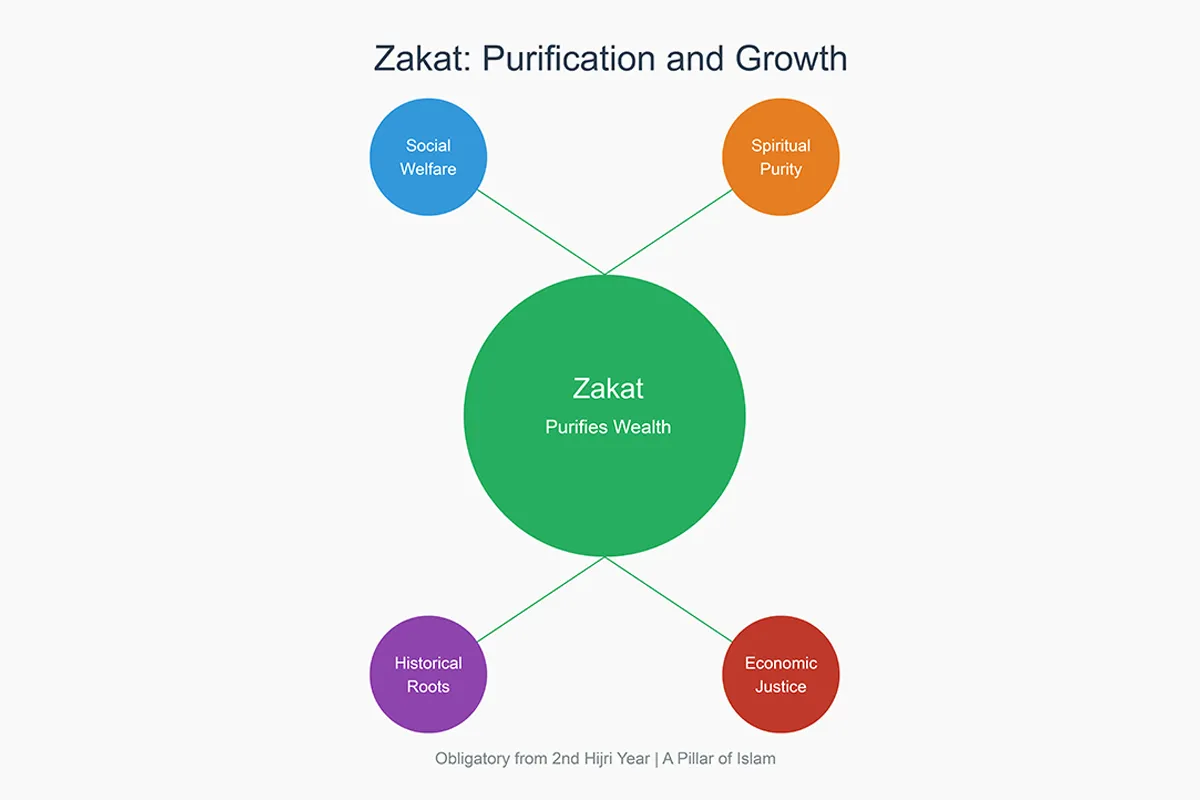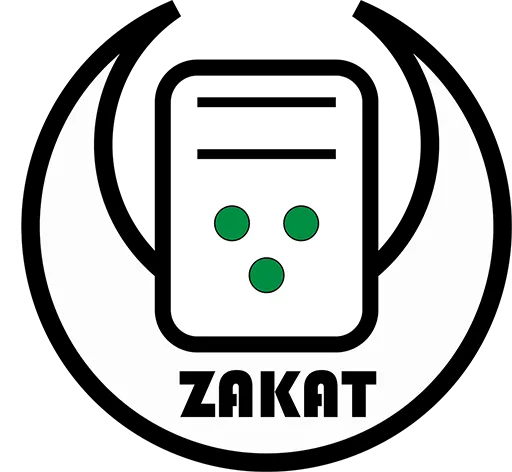
To understand the origins and history of Zakat, a cornerstone of Islamic finance and social welfare, is essential for every Muslim. But do you know exactly when Zakat was first mandated? Let’s explore this fascinating journey to uncover the Hijri year when Zakat became obligatory. 🌍
What Is Zakat?
Zakat, meaning “purification” and “growth,” is one of the Five Pillars of Islam. It is a form of charity that purifies wealth and fosters equality in society.
Key Features of Zakat:
- Mandatory for every eligible Muslim.
- Calculated based on excess wealth beyond personal needs.
- Distributed to specific categories of recipients (like the poor and needy).
Want to know how much you should give? Use an Advance Zakat Calculator for precise calculations!
Zakat Was Made Obligatory in Which Hijri Year?
Zakat became farz (obligatory) in the 2nd Hijri year. This momentous decision was revealed during the early years of the Islamic community in Madinah. Why the 2nd year, though?
Here’s the context:
- Prophet Muhammad (PBUH) migrated to Madinah in the first Hijri year, marking the start of the Islamic calendar.
- Early Madinan society emphasized community building, economic equity, and spiritual growth.
- Zakat was formalized in the 2nd Hijri year to instill economic justice.
Learn more about the history of Zakat in Islam.
The History of Zakat
Zakat Before the Advent of Islam
The history of Zakat is intertwined with that of Salat (prayer). The Quran indicates that, like Salat, the act of Zakat existed in the laws of previous prophets.
All followers of Prophet Ibrahim (AS) were familiar with the concept of Zakat. Surah Al-Ma’arij (70:25) describes it as “a specified right.” Because Zakat and charity were pre-existing Sunnahs, the Prophet (PBUH) continued this practice with necessary reforms.
Examples of Zakat in Previous Prophetic Traditions:
- Prophet Isma’il (AS): “Also mention in the Book (the story of) Isma’il: He was (strictly) true to what he promised, and he was an apostle (and) a prophet. He used to enjoin on his people Salat and Zakat, and he was most acceptable in the sight of his Lord.” [Surah Maryam 19:54-55]
- Zakat of the Jews: “And (remember) when We made a covenant with the Children of Israel, (saying): Worship none save Allah (only) and be good to parents and to kindred and to orphans and the needy and speak kindly to mankind; and establish Salat and pay Zakat.” [Surah Al-Baqarah 2:83]
- Progeny of Prophet Ishaq (AS) and Yaqub (AS): “And We sent them inspiration to do good deeds and to be diligent in the Salat and pay Zakat.” [Surah Al-Anbiyaa 21:73]
- Prophet Isa (AS): “He said: Lo! I am the slave of Allah. He has given me the Scripture and has appointed me a Prophet. And has made me blessed wheresoever I may be and has enjoined upon me Salat and Zakat so long as I remain alive.” [Surah Maryam 19:30-31]
Zakat in the Time of the Prophet Muhammad (PBUH)
When we study Zakat during the time of the Prophet Muhammad (PBUH), we are delving into its foundational structure. Initially:
- In Makkah, Zakat was voluntary, left to the individual’s faith and conscience.
- Verses such as Surah Al-Ma’arij (70:24-25) emphasized: “And in whose wealth there is a right acknowledged. For the beggar and the destitute.”
After the migration to Madinah:
- About 18 months later, Zakat became Fard (obligatory).
- Clear directives were revealed on Zakat payment.
- Zakat workers were appointed to collect and distribute it.
How Zakat Was Structured
The Quran provides principles for Zakat without exhaustive details, leaving specifics to the Prophet’s Sunnah. Examples include:
- Gold and Silver: “And there are those who hoard gold and silver and spend it not in the way of Allah. Announce unto them a most grievous penalty.” (Surah Al-Taubah 9:34)
- Crops and Fruits: “Eat of their fruit in their season, but render the dues that are proper on the day that the harvest is gathered.” (Surah Al-An’am 6:141)
- Earnings of Trade: “O ye who believe, give of the good things which ye have earned.” (Surah Al-Baqarah 2:267)
- Wealth from Beneath the Earth: “And of that which we have produced for you from the earth.” (Surah Al-Baqarah 2:267)
The Evolution of Zakat
Pre-Hijri Phase: Encouraging Charity
Before Zakat was obligatory, Muslims were urged to practice voluntary charity (sadaqah) to nurture empathy and generosity.
Post-Hijri Mandate: Zakat Becomes Obligatory
Once in Madinah, Zakat evolved into a formal system:
- Specific rules on who should pay and receive.
- Fixed rates for wealth categories.
- Administrative structure for collection and distribution.
Why Was Zakat Made Obligatory in the 2nd Hijri Year?
Several reasons underline the timing:
- Community Building: In Madinah, Muslims were forming their first cohesive society. Zakat strengthened bonds and reduced economic disparities.
- Spiritual Purification: Paying Zakat helped individuals detach from materialism.
- Social Welfare: It ensured that the vulnerable segments of society were cared for.
Explore the wisdom behind Islamic financial principles.
The Impact of Zakat on Society
Economic Justice
Zakat redistributes wealth, creating a balanced economic structure. It eliminates extreme poverty and prevents wealth hoarding.
Spiritual Growth
By purifying wealth, Zakat fosters gratitude and humility. 🌸
Strengthening Brotherhood
Recipients of Zakat feel supported, fostering trust and unity among Muslims.
Check out how modern Zakat systems are addressing contemporary challenges.
Random Fun Fact 😍:
Did you know that the term Zakat is mentioned 32 times in the Quran?
Conclusion
The establishment of Zakat in the 2nd Hijri year reflects the importance of economic justice and social welfare in Islam. This divine obligation not only purifies wealth but also builds a harmonious society where everyone’s needs are met. As Muslims, understanding and fulfilling this obligation connects us to our faith and fosters compassion in our communities.
FAQs
The primary purpose of Zakat is to purify wealth, promote economic justice, and support the needy in society.
Zakat became obligatory in the 2nd Hijri year, shortly after the Prophet Muhammad (PBUH) migrated to Madinah.
Zakat can be given to eight categories of people, including the poor, the needy, and those in debt. The full list is mentioned in Surah At-Taubah (9:60).
Zakat is a mandatory form of charity with specific rules, while Sadaqah is voluntary and can be given at any time.
Gold, silver, trade earnings, agricultural produce, and buried treasures are examples of Zakatable wealth. Specific rules and thresholds apply to each category.
Zakat is calculated as 2.5% of the wealth that exceeds the Nisab threshold (minimum amount of wealth required for Zakat to be due).
Zakat fosters spiritual growth, eliminates poverty, and strengthens bonds within the Muslim community.
Traditionally, Zakat is reserved for Muslims, but Sadaqah can be given to non-Muslims in need.
